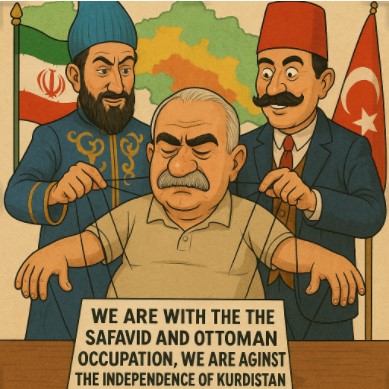The Systematic Abortion of the Kurdish National Cause Through Ocalan’s Turkey-Aligned ideology
Sherzad MamSani/ President of the Foundation for the Kurdistan–Israel Alliance, EastMed Strategic Studies Institute contributor.
For nearly half a century, the Kurdish people have waged an ongoing struggle for freedom, self-determination, and national independence. Tens of thousands have died or been imprisoned in pursuit of this just cause. The Kurdistan Workers’ Party (PKK), under the leadership of Abdullah Öcalan, was once seen as a revolutionary force within this liberation movement.
But a deeper investigation into the ideology and political evolution of Öcalan and the PKK reveals a profound and systematic betrayal. What began as a movement for the independence of Kurdistan has gradually transformed into an ideological tool designed to serve Turkish state interests — under misleading slogans like (democratic nation) and (brotherhood of peoples).
This article presents a six-point critique of Abdullah Öcalan’s trajectory, exposing the contradictions, ideological manipulations, and political compromises that have turned the PKK from a nationalist force into a guardian of Turkish territorial integrity.
1. From National Liberation to Tactical Betrayal
The PKK initially declared its goal as the (liberation of Greater Kurdistan) across all four parts (Turkey, Iran, Iraq, and Syria). This declaration mobilized thousands of Kurdish fighters and civilians, who joined the movement believing they were sacrificing for the dream of an independent Kurdish state.
However, the reality soon became clear: the goal of independence was a (tactical slogan), not a strategic vision. Internally, Öcalan and the PKK elite were committed to a vague leftist vision of coexistence with Turks and other groups, promoting (democratic autonomy) instead of statehood.
(The blood of thousands of Kurdish martyrs was shed under a banner that the party itself never believed in.)
2. Ideological Contradiction: A Stalinist-Marxist Party Using Nationalist Rhetoric
At its core, the PKK was born as a (Marxist-Leninist-Stalinist) party that embraced:
• Class struggle over national struggle.
• The abolition of the nation-state.
• Centralized leadership and ideological purism.
In classical Marxist thought, national liberation movements are seen as (bourgeois) distractions from the global proletarian revolution. Lenin himself endorsed national self-determination as a tactical phase — not an ultimate goal.
The PKK thus stands ideologically opposed to Kurdish nationalism. Yet, it used nationalist language to recruit Kurds — only to discard that vision later in favor of (internationalist revolution).
This ideological bait-and-switch deceived generations of Kurdish youth who fought and died for a dream that the party’s inner circle never truly embraced.
3. Internal Repression: Killing Kurds in the Name of Liberation
Over the past four decades, the PKK has engaged in:
• The execution of thousands of Kurds accused of being (spies), (traitors), or (fifth columnists).
• The assassination of critics within the Kurdish community.
• Armed suppression of rival Kurdish political parties and movements.
• The destruction of Kurdish villages by entrenching fighters in civilian areas, inviting Turkish retaliation.
Despite promoting (democratic society) as a goal, the party itself:
• Has never changed its leadership since its founding in 1978.
• Is still symbolically and organizationally centered around Öcalan.
• Operates through a rigid, top-down Stalinist structure.
(How can a party that murders its own dissenters claim to bring democracy to others?)
4. Anti-Westernism and Strategic Isolation of the Kurds
In his prison writings, Abdullah Öcalan repeatedly frames (Western civilization, capitalism, and liberal democracy) as the (greatest threat to Eastern peoples).
In doing so, he:
• Glorifies the (Eastern spirit) and pre-modern traditions.
• Encourages Kurds to reject the West and align with authoritarian states like (Iran, Russia, China, and even Afghanistan).
• Portrays the Kurdish desire for statehood as a product of (Western imperial manipulation).
This anti-Western stance:
• Conflicts with the historical reality that Kurds are among the most tolerant and democratic peoples of the region.
• Ignores the fact that it was the West — not the East — that gave refuge, asylum, and recognition to Kurdish activists and intellectuals.
• Contradicts Turkey’s own obsession with joining NATO, the EU, and benefiting from Western economic and military partnerships.
Öcalan’s ideology has alienated the Kurdish struggle from the very global systems of support and legitimacy it needs.
5. Serving Turkish National Security: Öcalan and Erdoğan Speak the Same Language
Perhaps the most shocking indicator of Öcalan’s political transformation appears in his book (The Roadmap to Democratic Resolution), where he writes (p. 173):
(While we seek to protect Turkey from great threats, we also wish for Turkey to regain its former greatness and glory.)
This statement sounds less like a revolutionary and more like a Turkish nationalist echoing Erdoğan’s neo-Ottoman dreams. Öcalan adds:
(With a final settlement, the PKK’s military capabilities will serve the Turkish Republic, removing the existential threats orchestrated by global powers using the Kurdish issue — as they did in Kosovo, Lebanon, Bosnia, Iraq, and the Kurdish entity in northern Iraq.)
In other words, Öcalan:
• Opposes Kurdish independence movements in Iraq and Syria.
• Aligns with Turkish narratives that treat Kurdish self-rule as a (foreign plot).
• Offers to integrate the PKK militarily into the Turkish state — essentially turning Kurdish fighters into Turkish shock troops.
(This is not revolution — it is full ideological surrender.)
6. The February Message: Öcalan Fears the Collapse of Turkey
In his most recent letter (February 2025), Öcalan warns that if the peace process fails:
(The Turkish state will collapse and be divided.)
But instead of framing this collapse as an opportunity for Kurdish justice and independence, he presents it as a (disaster to be avoided).
Öcalan urges Kurds to:
• Embrace the unity of the Turkish state.
• Support (one Turkish nation, one flag, one identity).
• Fight alongside Turks to preserve the (Kemalist-Ottoman ideological legacy).
But we — the Kurdish people — believe the opposite:
The fall of Turkey is not a disaster, but a delayed historical correction.
The lands now called Turkey belong not just to Turks, but to Kurds, Armenians, Greeks, Assyrians, and other indigenous peoples.
Öcalan’s position thus turns him from a liberation figure into a protector of the very system that has oppressed and massacred Kurds for a century.
Abdullah Öcalan is no longer a revolutionary leader of the Kurdish cause. He has become an ideological agent of the Turkish state, a defender of its territorial integrity, and a barrier to Kurdish independence.
Through his writings, he has:
• Delegitimized the Kurdish national dream.
• Vilified Western allies and liberal democracy.
• Offered the PKK’s fighters to the Turkish Republic.
• Condemned the fragmentation of Turkey as a threat, rather than an opportunity.
As the post-Lausanne order of the Middle East unravels, and a new regional map begins to form, the Kurdish people must speak clearly:
(We do not wish to save Turkey — we wish to dismantle it.
We do not wish to preserve its borders — we wish to redraw them with justice.
We do not wish to serve it — we wish to liberate ourselves from it.)
The time for compromise is over.
The time for truth, justice, and independence is now.
References
• Abdullah Öcalan, (The Roadmap to Democratic Resolution), p. 173.
• Murray Bookchin, (The Ecology of Freedom), 1982.
• Human Rights Watch Reports on the destruction of Kurdish villages in Turkey.
• Öcalan’s open letters and messages (2013–2025).

